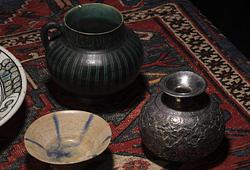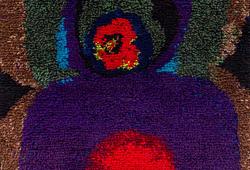Pablo Picasso
PABLO PICASSO, Etching, 1934, Signed in pencil and numbe
”Bacchus et Femme de Profil”. on Arches paper, published by Galerie Louise Leris, Paris 1961. I: 27.6 x 20 cm, S: 41.2 x 31.7 cm.
Not examined out of frame.
Provenance
Galerie Pierre, Stockholm.
Literature
Bloch 274.
More information
Etching and dry needle, created by Pablo Picasso on January 30, 1934 in Paris.
The date of the etching's creation can be read out in a mirrored inscription. In the lower right corner of the work, the dating is clearly seen.
In the right part of the picture is a bearded gentleman with fig leaves in a flower wreath on his head: It is the god Bacchus in Pablo Picasso's version.
With both hands he holds tightly to a wine carafe with classic Greek decoration, so-called geometric pattern. Morphologically, the wine carafe can also symbolize something completely different in this work of art.
In the left, a beautiful woman is seen in profile, with a kylix (ancient Greek beverage cup) in her right hand.
Her left hand rests on the table. Her gesture with the beverage cup gives the feeling that she wants more wine from the god Bacchus.
Exact versions of this etching are included in several museum collections, including the Gracefield Arts Center in Scotland, the Gottfried Keller-Stiftung Kunstmuseum in Switzerland and the Vivanco Fundación Museum in Spain.
Artist
Pablo Picasso (1881-1973), Spanish painter, printmaker, sculptor, and ceramist. Active in France since 1900. He is, alongside Matisse, the most dominant artist of the 20th century. After passing through a blue period, a pink period with circus scenes and harlequins, he created his first cubist painting, "Les Demoiselles d'Avignon," in 1907 under the influence of African sculptures. Together with Braque, he further developed cubism by breaking down surfaces, which were then represented in various simultaneous aspects. In 1912, he left nature and recreated a new reality, only to return to acrobats in 1916. During the 1920s, he approached surrealism and worked with whimsical forms while also producing drawings and etchings in line style. During the Spanish Civil War, he was violently stirred, and it is now that his great protest in the painting Guernica comes to fruition. In the late 1940s, he settled by the Mediterranean and produced nymphs, centaurs, and fauns, as well as paraphrases of the works of old masters, and painted powerful terracotta ceramics in Vallauris. His abundant graphic production follows the same development as his painting.
Pablo Picasso was not only an artist but also a skilled ceramist. During his lifetime, he created hundreds of ceramic works, such as jugs, vases, and plates. Picasso's passion for ceramics began when he visited the annual ceramics exhibition in Vallauris in southern France in 1946 and was introduced to the craft by the artist couple Suzanne and Georges Ramié, who owned the Madoura pottery. During the following years which he spent in Vallauris, Picasso met his second wife, Jacqueline Roque, whom he depicted on the ceramic pieces. He also decorated the ceramics with abstract animals and bullfighters in a cubist style.
Read more
























